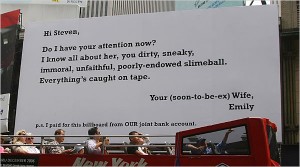 (Sure sounds like a Michael Douglas or Richard Gere movie.) Some months ago, Weber-Shandwick’s Robert Ricci spoke out against deceptive viral and word-of-mouth marketing tactics. This blog also has weighed in on the subject from time to time.
(Sure sounds like a Michael Douglas or Richard Gere movie.) Some months ago, Weber-Shandwick’s Robert Ricci spoke out against deceptive viral and word-of-mouth marketing tactics. This blog also has weighed in on the subject from time to time.
In fact, I recently joined PR bloggers Paull Young/Trevor Cook’s effort to end the nefarious industry practice known as astroturfing. Others lent their names to the movement, including Cluetrain Manifesto co-author David Weinberger.
Last week, we learned of a hugely successful viral marketing campaign to promote a Court TV program. The promotion combined outdoor advertising and a weblog written by someone named “Emily.”
“The billboard created interest… A booking agent from ‘Good Morning America’ sent an e-mail to Emily inviting her on the show. British Glamour wanted to make her the subject of a feature article…”
After some digging, it was learned that there is no Emily and the entire effort was fabricated to attain the elusive Holy Grail of marketing — viral buzz. For some, or rather, many in our line of work, the Court TV ploy will be viewed as a grand success.
“The good news is that even after the ruse was discovered, people visited the Emily blog, pushing it to one million hits by the end of Thursday…Court TV’s marketing group liked the idea so much that they made it a large part of the campaign.”
For others (like me), it’s just one big, admittedly clever, consumer deception.
PR astroturfing viral buzz Court TV public relations Emily billboard television